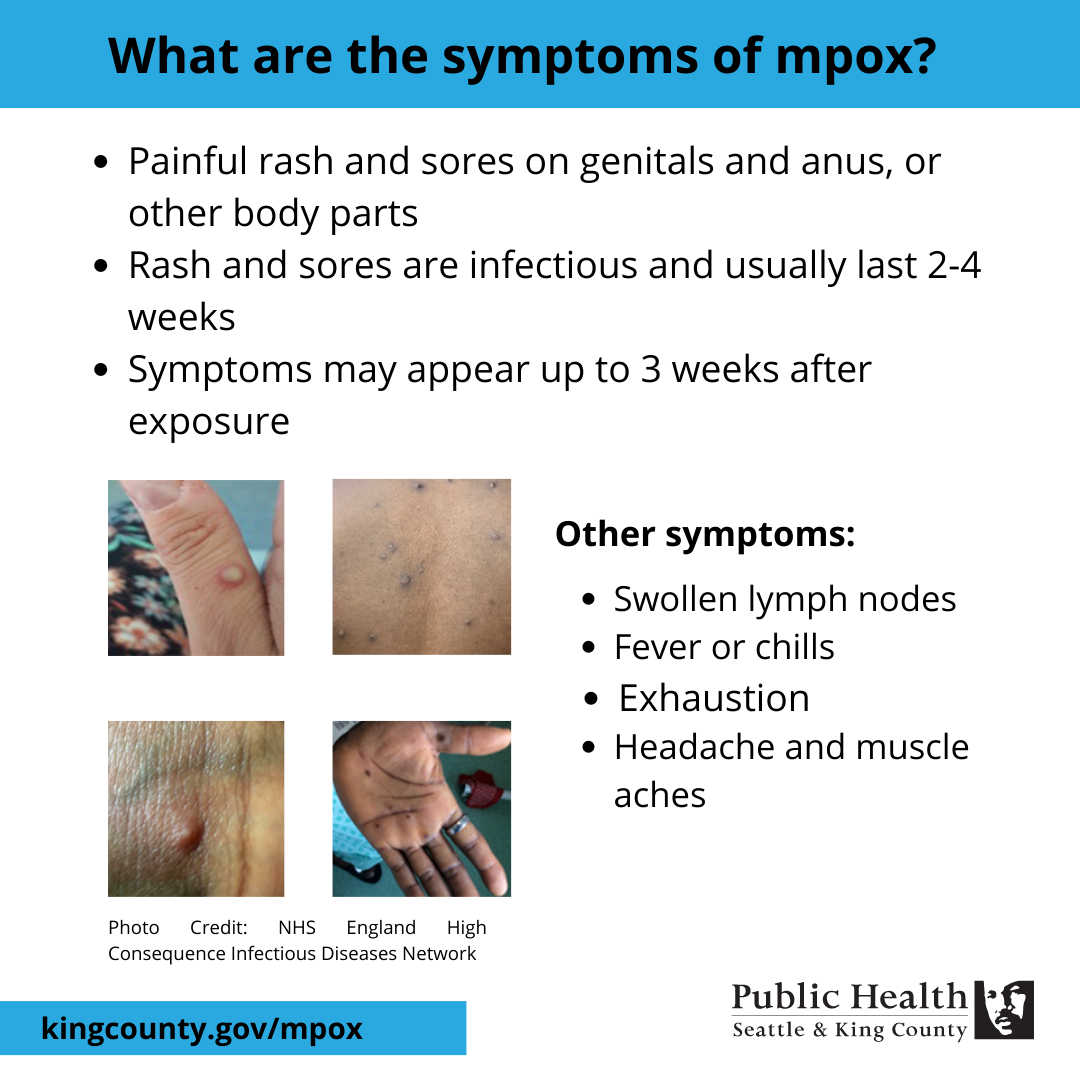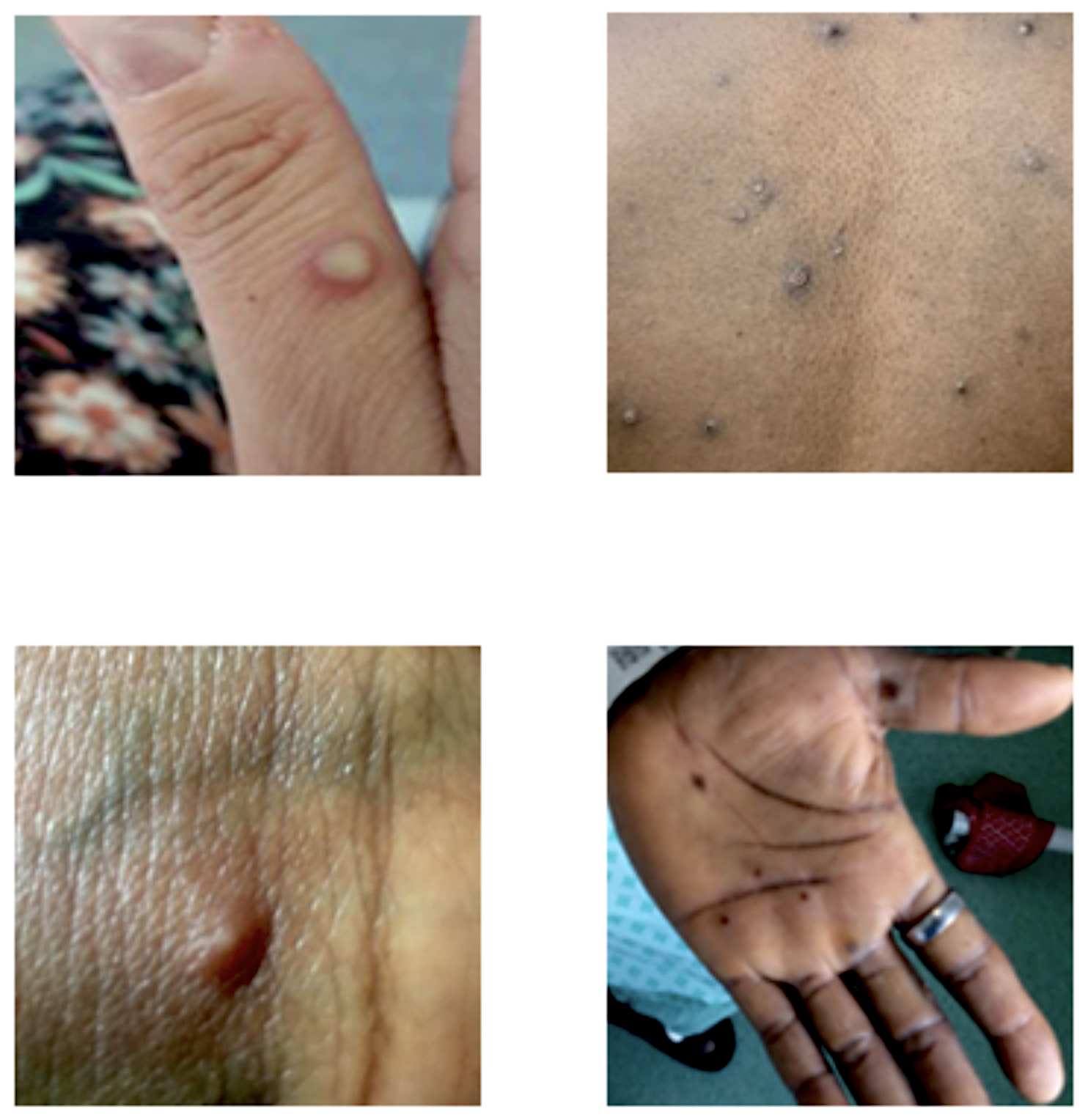Mpox resources
Short URL: kingcounty.gov/mpox
Mpox is a disease caused by a virus. It is typically spread through close physical contact.
The virus often causes a rash, which may look like bumps on your skin, blisters, or ulcers. Some people have a flu-like illness before they develop a rash. Infections with the strain of mpox virus identified in the U.S. outbreak are rarely fatal, and most people recover in 2-4 weeks.
Vaccine for mpox can help to prevent disease or make it less severe. If you think you may have been exposed or have symptoms, contact your health provider immediately. Visit our mpox vaccine page for more information.
If you have symptoms of mpox you should contact your health care provider immediately for an evaluation. People with symptoms may also be seen at Public Health's Sexual Health Clinic.
Data: Current mpox cases and vaccine administration
Current mpox cases and vaccine administration, updated monthly.
Vaccine
Learn about who should get vaccinated and how to obtain it.
Treatment
Currently there is no treatment approved specifically for mpox virus infections. However, antivirals developed for use in patients with smallpox may prove beneficial against mpox.
Infographics
Educational slides and social posts to spread awareness about mpox.
How mpox spreads
According to the CDC's most current information, mpox is usually spread from one person to another through close, often skin-to skin contact. Routes of transmission include:
- Direct contact with the infectious rash, sores, scabs from a person with mpox.
- Through skin-to-skin contact during intimate contact such as kissing, cuddling, or sex.
- Contact with objects, fabrics (clothing, bedding, or towels), and surfaces that have been used by someone with mpox.
- Through oral fluids (saliva) during kissing.
Symptoms
People who get sick usually develop a painful rash. They can have flu-like symptoms including: fever, headache, back and muscle aches, swollen lymph nodes, and exhaustion.
The rash can appear as sores on or near the genitals or anus, but sometimes occur in other areas like the hands, feet, chest, face, or in the mouth. Symptoms may include a single lesion or lesions on the genitals, anus and surrounding area, lesions in the mouth, and symptoms of anal or rectal pain or bleeding.
Sores often go through several stages, including scabs before healing. The rash can look like pimples or blisters and may be painful or itchy.
Symptoms usually start within two weeks of exposure to the virus but can start up to three weeks later. mpox can be spread from the time symptoms start until the rash has healed, all scabs have fallen off, and a fresh layer of skin has formed. The illness typically lasts 2-4 weeks.
The disease can be serious, especially for immunocompromised people, children, and pregnant people.
What to do if you have symptoms
- If you have symptoms of mpox such as a new, unexplained rash or lesions on any part of your body, you should contact your health care provider immediately for evaluation. People with symptoms can also be seen at the Public Health's Sexual Health Clinic at Harborview Medical Center.
- Cover the rash with clothing and/or bandages
- Avoid sex and other close, intimate contact until you have been checked out.
- Avoid gatherings, especially if they involve close, personal, skin-to-skin contact or prolonged face-to-face contact.
- Talk to your partner about new or unexplained sores or rashes on your body or your partner's body, including rashes on the genitals and anus, and other symptoms and follow up with your provider if you suspect mpox or have questions.
- People with new rashes should also be aware that the rate of syphilis is rising in King County and nationally.
- If you don't have a provider or health insurance, you can contact Public Health's Access and Outreach program, 1-800-756-5437 to be connected to a medical provider.
About King County cases
Anyone who has been in close contact with someone who has mpox is at risk. To date, most of the people diagnosed with mpox in King County have been among men* who reported close intimate contact with other men, sometimes with anonymous or multiple partners.
*includes people assigned male at birth.



 Translate
Translate